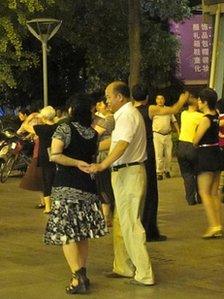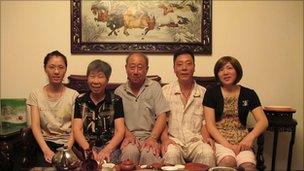China's pension system waltzes into crisis
- Published

Old people dance to keep fit in China
At a park in central Shanghai, the city's elderly waltz to the strains of pop songs.
They have lived long enough to see the good times. Their country's becoming richer and life expectancy is on the increase.
"Old people dance because they are afraid of dying," says Tian Xia, 58, a regular attendee. "And that's why they dance, to stay healthy."
But growing old in China is not always so serene. The country's population is rapidly ageing.
According to official statistics, there are currently 167 million Chinese over 60.
By the year, 2050, that figure is projected to increase to almost 400 million - a quarter of the population.
One of the main reasons for the greying of China's population is the country's population controls, which mean that fewer young people are being born.
That includes the one-child policy, which mostly affects families living in urban areas.
Demographic dilemma
Birthrates are now down by one-third compared with 30 years ago.
And that means fewer young people to look after the country's ageing population.
"We are expecting some kind of crisis in the pension system in next 20 years," says Professor Peng Xizhe, a population expert at Shanghai's Fudan University.
"We don't want a crisis, but we will have to work very hard as time is running out."
In Shanghai one in five of the population has reached retirement age
China's economy may be booming - it is on track to be the world's second-largest this year.
But the country has yet to work out how to pay for its rapidly ageing population.
Pensions are low or non-existent here. There are different provisions for people living in urban areas and those in the countryside.
Family way
The Chinese government is currently working to reform the system. But Prof Peng Xizhe believes there is only so much that the government can do.
He says that China will have to create a "multi-pillared" system, in which the government, the family, and other organisations care for the elderly.
Traditionally, the young care for the old in China.

Chinese families look after their elderly relatives
Yan Yunying is one of them. The 22-year-old works in finance.
She also cares for her grandparents and helps her father look after her mother, who is ill with cancer.
But it is tough to hold down a job and to get a boyfriend while supporting your entire family.
"The pressure on me is increasing," she says. "But this is my responsibility and I try and balance my work with my family."
Yan Yunying says that some of her friends simply find the stress too much.
Care market
In the boom city of Shanghai, the problem is at its most acute.
One in five of the city's residents is now of retirement age.
Retirement homes - once unheard of here - are beginning to open their doors.
One of them is the luxurious Cherish Yearn home on the outskirts of the city.
It boasts a swimming pool, a huge gym, a selection of classes and a tranquil setting with the home set round a series of ponds.
Xi Zhiyong, the owner of the home, believes that the market for caring for the elderly has huge potential.
"Because of the rising number of old people - there's an increase in the demand for care," he says.
"In 10 years, there's set to be more than 200 million old people in the country. You can only imagine how big the demand will become - it just will keep on growing."
But these homes are only an option for the wealthy elite. For others, painful decisions will have to be made.
This country has yet to work out how to provide for its elderly. And it's a problem that will be inherited by future generations.